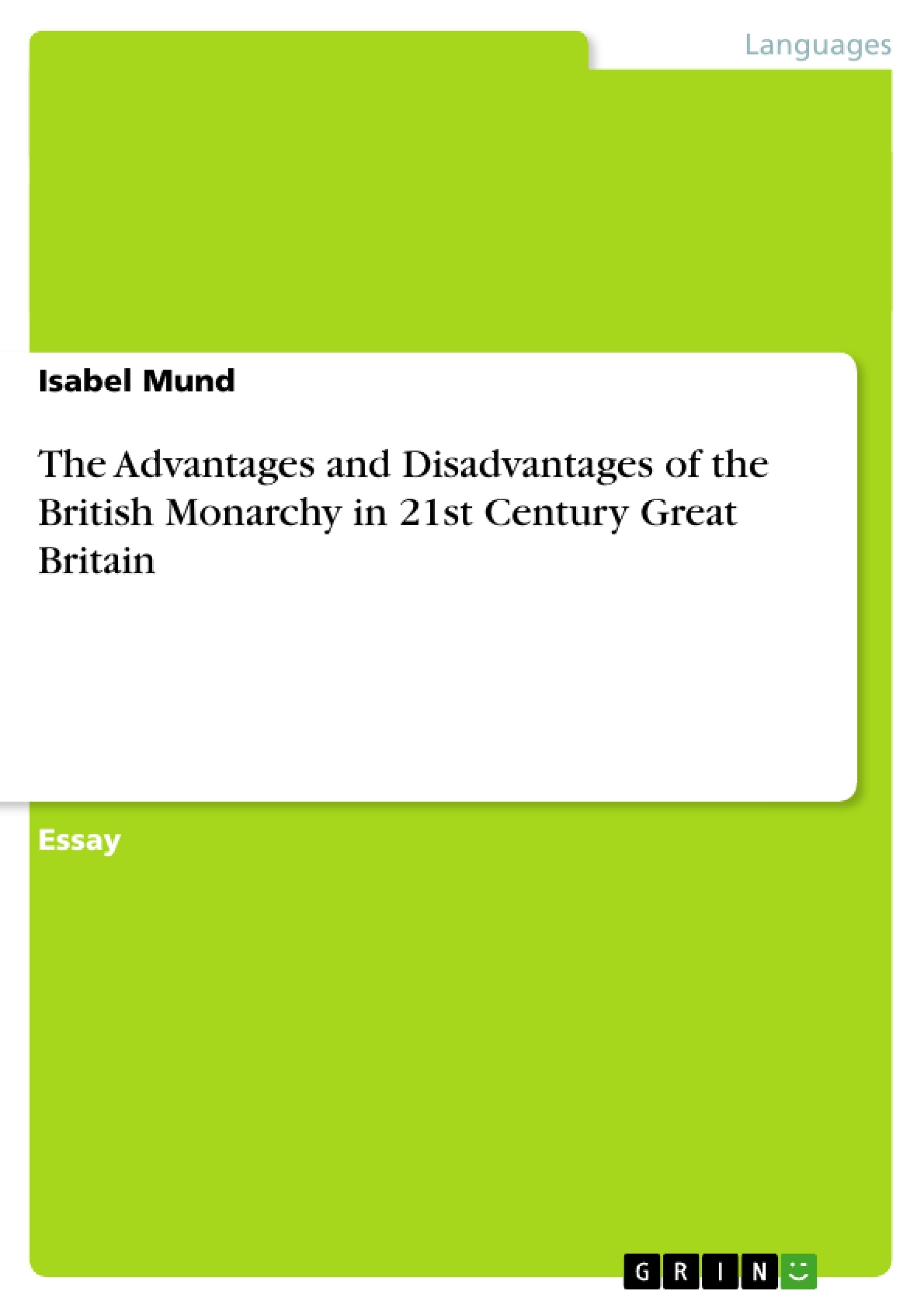This essay discusses the advantages and disadvantages of the contemporary British Monarchy. *** Diese Arbeit beschäftigt sich mit den zeitgemäßen Vor- und Nachteilen der Monarchie in Groß Britannien und diskutiert auch die Möglichkeit ihrer weiteren Aufrechterhaltung.
Table of Contents
- Introduction
- Advantages: Traditional, Participating, Unifying
- Disadvantages: Expensive, Restricting, Unpopular
Objectives and Key Themes
This essay examines the advantages and disadvantages of the British monarchy in 21st-century Great Britain. It avoids the question of abolishing the monarchy but instead analyzes its influence and importance within British society.
- The historical tradition and symbolic role of the monarchy.
- The monarchy's participation in public life and its unifying effect on society.
- The financial burden of the monarchy on taxpayers.
- The monarchy as a symbol of a potentially restrictive social system.
- The declining popularity of the monarchy among the British public.
Chapter Summaries
Introduction: This introductory section sets the stage by referencing the tragic death of Jacintha Saldanha, a nurse who became the victim of a hoax call involving the royal family. This event is used to frame the central question: What is the purpose of the British monarchy in the modern world, given its historical context and the rise of democratic systems? The essay's objective is to outline the advantages and disadvantages of the institution, rather than advocating for its abolition.
Advantages: Traditional, Participating, Unifying: This section argues that the longevity of the British monarchy, dating back to Aethelstan in 925, constitutes a significant advantage. Despite periods of republican movements and reform, the monarchy has persisted, becoming deeply ingrained in British culture and identity. While its political power is limited, the monarchy maintains a crucial symbolic role, highlighted through events like the State Opening of Parliament, royal tours, and high-profile weddings, fostering a sense of national unity and participation. The argument posits that the monarchy provides a sense of stability and a common point of identification for the diverse population of Great Britain.
Disadvantages: Expensive, Restricting, Unpopular: This section counterpoints the advantages by focusing on the financial costs associated with the monarchy. The significant expenses, covered by taxpayers, are critiqued, especially considering potential alternative uses of these funds. The discussion then moves to a critique of the monarchy as a symbol of a hierarchical and potentially restrictive social system, contrasting it with the ideals of a modern, open society. Finally, this section presents evidence of declining popularity, referencing surveys indicating growing support for a republic and a shrinking approval rating for the royal family amongst the British population.
Keywords
British Monarchy, Constitutional Monarchy, Tradition, National Unity, Public Finances, Social Inequality, Republicanism, Public Opinion, Royal Family, Political Symbolism.
Frequently Asked Questions: A Critical Analysis of the British Monarchy
What is the purpose of this text?
This text provides a comprehensive overview of the British monarchy, examining both its advantages and disadvantages in the 21st century. It aims to analyze the monarchy's influence and importance within British society without advocating for its abolition.
What topics are covered in this analysis?
The analysis covers a range of topics, including the historical tradition and symbolic role of the monarchy; its participation in public life and unifying effect; the financial burden on taxpayers; its potential role as a symbol of a restrictive social system; and its declining popularity.
What are the key advantages of the British monarchy, according to this text?
The text highlights the monarchy's long-standing tradition and its role as a unifying symbol for Britain. Its continued existence, despite periods of republican movements, is seen as an advantage. The monarchy's participation in public life, through events like the State Opening of Parliament and royal tours, is presented as fostering national unity and a sense of shared identity.
What are the key disadvantages of the British monarchy, according to this text?
The text points to the significant financial costs associated with the monarchy, which are borne by taxpayers. It also critiques the monarchy as potentially representing a hierarchical and restrictive social system, at odds with the ideals of a modern, open society. Finally, the declining popularity of the monarchy among the British public is presented as a significant disadvantage.
What is the structure of the text?
The text is structured as a preview, including a table of contents, objectives and key themes, chapter summaries, and keywords. The chapter summaries delve into the introduction, advantages (tradition, participation, unification), and disadvantages (expense, restriction, unpopularity) of the British monarchy.
How does the text begin?
The introduction uses the tragic death of Jacintha Saldanha, a nurse who was a victim of a hoax call involving the royal family, to frame the central question of the monarchy's purpose in the modern world.
What kind of conclusion does this text offer?
The text does not offer a definitive conclusion on whether the monarchy should be abolished or reformed. Instead, it presents a balanced analysis of its advantages and disadvantages to allow the reader to form their own opinion.
What are the keywords associated with this analysis?
The keywords include: British Monarchy, Constitutional Monarchy, Tradition, National Unity, Public Finances, Social Inequality, Republicanism, Public Opinion, Royal Family, and Political Symbolism.
- Quote paper
- Isabel Mund (Author), 2013, The Advantages and Disadvantages of the British Monarchy in 21st Century Great Britain, Munich, GRIN Verlag, https://www.grin.com/document/232705




